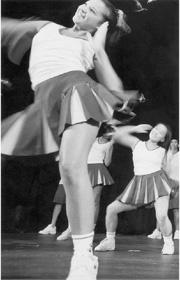THERE WAS A RAT the size of a squirrel standing in the hallway. I should have been shocked—it was the first time I’d seen a rat—but I was too busy kissing a Scottish guy who smelled like beer. It was 5am, and we had just returned to the hostel from a night club on the other side of Hong Kong. I didn’t say anything about the rat; no point in breaking the mood.
But it was broken soon enough, when he said, “Come into my room.” I recoiled at the thought of taking it further in this environment—and becoming one of them.
“Them” meant the seedy travelers staying at the regally named Victoria Hostel, where a night in a co-ed dorm cost only US$5. There were a number of hostels like this in the Times Squarelike Tsimshatsui district of Kowloon; the most notorious, the nearby Chungking Mansions, was a high-rise ghetto unto itself. They seemed to attract three types of people: the most money-pinching, die-hard budget travelers (who were usually from Germany), suburban college grads (like me) seeking to experience “real life,” South Asian immigrants trying to get established, and those who were just plain down and out. I’m not sure which was the worst.
The first set had been on the road a long time—a year or more was typical—and it showed. They were thin, their clothes were raggedy, and their behavior was immodest, to say the least. Somewhere along their long journeys the barriers to farting loudly in public and getting romantic with large rodents nearby had broken down.
The British travelers used their Hong Kong working visas to stay for months, taking jobs at touristy bars and restaurants to gather money for trips to Indonesia, Thailand, or India. But young people always have a hard time saving money, and this was no exception. They’d work nights, sleep days, and fritter away their slim earnings on drugs and alcohol. I worked as a bicycle messenger for $100 in Hong Kong currency (about $14 US) a day, under the table. I needed the money less than I needed to do something. I had just returned from a three-month bicycling trip through mainland China, and was trying to decide whether to go back to the states, enter grad school, get a job, or keep traveling and delay the inevitable. Whenever I called my anxious mother, I said without conviction that I’d be home soon. It would be another year before I saw her again.
I SHARED MY ROOM with seven others, including a Chinese/Caucasian woman named Paula. I don’t know how long she’d been at the hostel, but it was clear she was going nowhere. She was emaciated and had holes and cuts like train tracks up and down her arms. Two young men from India had also been there for several months, trying to make a go of it hawking cheap jewelry on the street. Underneath their bunks lay a clutter of baskets, bowls, and pans, and a sack of flour they used daily to bake naan. They made it look so easy; they’d pinch off balls of dough, slap them back and forth, and in seconds have perfectly flattened circles, ready to bake. Afterwards, they’d gather with other Indian men staying at the hostel and pass around a steaming basket of naan. My mouth would water, but I never asked for any—not out of politeness or shyness, but because naan was all I wanted from them. Frankly, they gave me the geebies. One of them looked like a caricature of a pimp: skinny and angular, with a gold-toothed smile and a fluorescent green nylon jogging suit. One afternoon, I got back from work early and found him in his bunk with Paula. When he saw me, he tried for privacy by hanging up some towels.
The only people who seemed to have any kind of a normal life in the hostel were the manager and his wife, who were from Bangladesh. They had been working and living there for three years, trying to save money for a house. Their plucky 6-year-old daughter made it a point to introduce herself to every stranger who came into the hostel. “Where are you from?” she’d start. She was bright, and knew not only Bengali and English but a smattering of Cantonese. A couple of times after work, I played hopscotch with her on the roof. I wondered what she’d be like when she got older. I liked to think that the experience of growing up in the hostel would somehow leave her unscathed and make her sophisticated, cool, and liberal-minded.
One evening, I saw her outside, hanging out with the two Indian guys. When I went up to her, she held up a brochure. It had pictures of Rolex and Cartier knock-offs. “Copy watch. Copy watch,” she piped, with the same glee as when she shouted, “I win, I win” during hopscotch.






